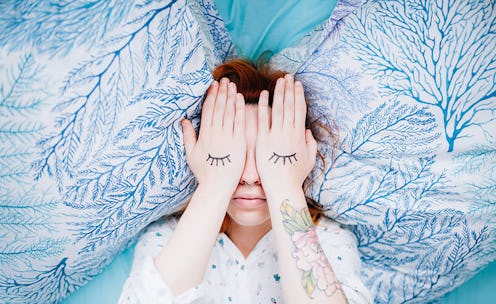Life
This Super Common Health Condition Makes You THREE Times As Likely To Sleepwalk

Sleep disruption is the absolute worst. As someone with a pretty unhealthy caffeine and Twitter addiction, I am all too familiar with watching the hours tick away until my alarm goes off. I drink that last black coffee knowing full well that I will be reading a new Brexit (non-)update come 3 a.m. But what about more serious sleep disorders? What about those who have trouble staying in bed once they’re asleep? Many don't realise just how common sleepwalking is, and how it can be brought on by the the most innocuous habits. Here are some tips to prevent sleepwalking, and what to do if it occurs.
Research conducted by Stanford University found that close to 4 percent of adults in the U.S. sleepwalk. That is more than 8.4 million people. Stanford's research also revealed that people with depression are 3.5 times more likely to sleepwalk, and conditions such as alcohol dependency and OCD can also be contributing factors. In addition, studies show that you are more likely to be up and about in your sleep if you have a family member who does the same. Four out of five sleepwalkers have another person in their family with the same condition, according to a report from Mattress Online.
In an effort to establish the causes of sleepwalking, and find out the measures people can take to prevent it, Mattress Online spoke to Lauren Peacock, a Child Sleep Consultant and Owner of Little Sleep Stars.
While sleepwalking can be caused by things out of your control, Peacock highlighted that having caffeine or other stimulants before bedtime will likely increase your chances of experiencing the condition. That’s me told. In addition, too little or poor-quality sleep can also be a trigger, as can poor sleep onset latency (AKA the length of time it takes you to feel asleep). Nodding off as soon as you hit the pillow can cause issues, as can taking more than 30 minutes to fall asleep. Peacock also identified that high levels of stress and anxiety can lead to sleepwalking, and so can drinking alcohol or taking certain medications (including antihistamines).
According to Peacock, all these triggers can impede the body’s ability to settle down into restful, non-rapid-eye-movement sleep. If the transition into deep sleep is interrupted, sleepwalking is more likely to occur.
So, how do you lessen your chances of midnight wanderings? A bit of self care and a nighttime routine might be the answer, and you better believe I can get on board with that. Peacock suggests:
- Exercise and outdoor activities, to keep your body clock in check.
- Avoid caffeine late in the day. That means no more bed-time coffees.
- Instead of messing about on your phone before bed, set it to one side an hour before you plan to drift off, and have a relaxing bath or read a book instead.
- Ensure your bedroom is a place you actually like to be. It helps if it is cool, dark, and quiet.
- If you are crashing as soon as you get into bed or it takes you longer than 30 minutes to sleep, it may be worth taking steps to address the potential underlying factors such as feelings of anxiety or alcohol consumption.
But what about if you find someone else sleepwalking? The best thing you can do for a sleepwalker, according to Peacock, is try to guide them calmly back to bed. You should then stay with them until they are settled down again. If that doesn’t work, you could try to wake them, but be sure to do this gently. Being woken up too suddenly isn’t pleasant at the best of times, let alone when you wake up stood in the middle of the kitchen with no recollection of how you got there. And, importantly, if problems around sleepwalking persist, the person book an appointment with their GP to discuss the condition in more detail.